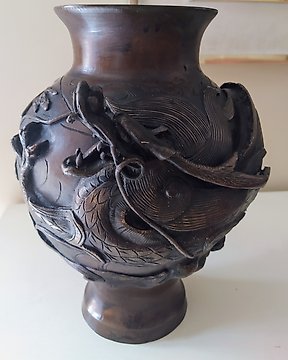
Βάζο - Μπρούντζος - Marked 'Yoshida zō' 吉田造 - Ιαπωνία - Meiji period (1868-1912)
Αρ. 83793603

Αρ. 83793603

【Important notes】
・International Buyers: Import duties, taxes, and charges are not included in the item price or shipping charges. These charges are the buyer’s responsibility.
・Please check with your country’s customs office to determine what these additional costs will be prior to bidding/buying. These duties are paid to your country's customs office and not to us. Prompt payment of these fees is necessary to ensure delivery of your item.
【Product details】
This pair of ceramic ihai (spirit tablet) from the Meiji period features a matching design. Each base is decorated with a lotus petal motif, and beneath, arabesque patterns and lotus flowers are depicted. Arabesque designs often symbolize eternity or continuity, while lotus flowers represent purity and spiritual enlightenment in Japanese culture.
The gentleman's ihai is inscribed with "Chikai'in," a high-ranking title ("Inden-go") often given to aristocrats or distinguished individuals. "Masafumi," the personal posthumous name, symbolizes the individual's personality and life. "Nichifu" represents daily Buddhist practice and the liberated state from worldly worries. "Koji" is a title awarded to male lay believers.
The lady's ihai reads "Shakuni," where "Shaku" refers to a monk who has renounced worldly life, while "Ni" denotes a female monastic. "Shingyo," the personal posthumous name, represents her practice and faith. "Daishi" is a title awarded to female lay believers. This spirit tablet pair likely commemorates an upper-class couple.
During the Edo period, posthumous titles became standardized, often with discriminatory distinctions based on rank. Titles like "Koji" and "Daishi" weren't used for lower classes, while "Inden-go" was reserved for high-ranking individuals. This title was given only to royalty and aristocrats.
The pair shows signs of wear, dirt, and stains due to age. Please refer to the photographs for the condition.
Dimension of a Ihai: approx. H 20 cm W 9.5 cm D 3.5 cm
・Please make sure to review all the provided information and images before placing your bid.
・We make every effort to accurately represent the product's colors and textures in our photos. However, due to differences in monitors and device displays, as well as photographic conditions, slight color variations between the photos and the actual product may occur. We ask for your understanding in advance.
Thank you for your interest, and happy bidding!
Πώς να πραγματοποιήσετε αγορές στην Catawiki
1. Ανακαλύψτε κάτι ιδιαίτερο
2. Υποβάλετε την κορυφαία προσφορά
3. Πληρώστε με ασφάλεια